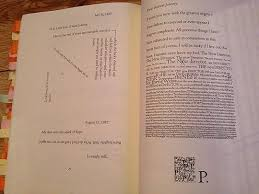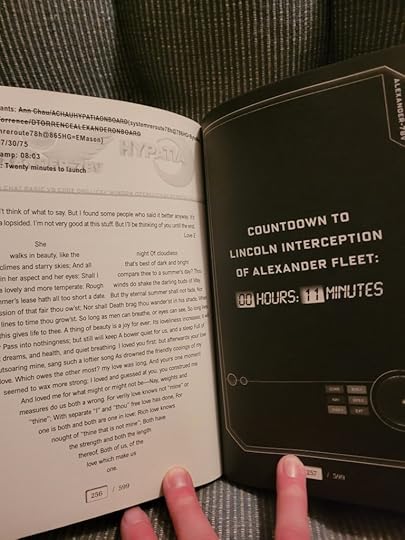And now for something truly surreal
I’m sure you’re dying to take a look at a classic novel, except without the distracting words. Here is Stevenson’s The Strange Case of Dr. Jekyll and Mr. Hyde, but just the punctuation
I’ll just present the first bit here:
. ; , ; ; , , , . , , ; , – , . ; , ; , . ; , , ; . ” ‘ , ” : ” . ” , . , , . . ; , – . – ; ‘ . ; , , , . , . , , – . , , . , , . , , , , , . – . , . , , ; , . , , , ; , – , , . , ; . ; , ; , . , , . ; ; ; , . . – ; , . ” ? ” ; , ” , ” , ” . ” ” ? ” . , , ” ? ” ” , , ” . : ” , ‘ , . — — , — — . , : , . , , ; ; ‘ . , . ‘ ; . , , , . , , . ‘ ; , , . , , , ; . . . ‘ , . ‘ . , , . , , ; , . , ; , . . , . , , . ; , — — , — — , , . ‘ , ‘ , ‘ . , ‘ . ‘ . ‘ , ‘ ; ; , . ; ? — — , , ‘ , ‘ , ‘ , . ; . , , , ‘ . . ‘ , ‘ , ‘ . ‘ , , ‘ , , ; , , . , . . . ” ” – ! ” . . ” , ” . . ” , ‘ . , ; , , ( ) . , ; . , . , , , ” , . . : ” ‘ ? ” ” , ‘ ? ” . . ” ; . ” ” — — ? ” . . ” , ; , ” . ” ; . , ‘ . ; , ; ( ) . , : , . ” ” , , ” . ” , ” . . ” . , , , . ; ; ‘ . ; . ‘ ; , ‘ . ” ; ” , ” . , ” ‘ . ” ” , , ” . ” , ” , ” ‘ . . ” ” , ” . , ” ‘ . . ” ” , ” . . ” ? ” ” . ; , – . , . ; , ‘ . ‘ , . , ; ; ‘ . ‘ ; . ” . . ”
There you go! The novel, sort of, in the sense of totally not the novel at all.
***
In order to be fair, let’s do now do the reverse by looking at an excerpt from a novel where the author was just too cool to bother putting in (most of) the punctuation; eg, this:
When it was light enough to use the binoculars he glassed the valley below. Everything paling away into the murk. The soft ash blowing in loose swirls over the blacktop. He studied what he could see. The segments of road down there among the dead trees. Looking for anything of color. Any movement. Any trace of standing smoke. He lowered the glasses and pulled down the cotton mask from his face and wiped his nose on the back of his wrist and then glassed the country again. Then he just sat there holding the binoculars and watching the ashen daylight congeal over the land. He knew only that the child was his warrant. He said: If he is not the word of God God never spoke. When he got back the boy was still asleep. He pulled the blue plastic tarp off of him and folded it and carried it out to the grocery cart and packed it and came back with their plates and some cornmeal cakes in a plastic bag and a plastic bottle of syrup. He spread the small tarp they used for a table on the ground and laid everything out and he took the pistol from his belt and laid it on the cloth and then he just sat watching the boy sleep. He’d pulled away his mask in the night and it was buried somewhere in the blankets. He watched the boy and he looked out through the trees toward the road. This was not a safe place. They could be seen from the road now it was day. The boy turned in the blankets. Then he opened his eyes. Hi, Papa, he said. I’m right here. I know. An hour later they were on the road. He pushed the cart and both he and the boy carried knapsacks. In the knapsacks were essential things. In case they had to abandon the cart and make a run for it. Clamped to the handle of the cart was a chrome motorcycle mirror that he used to watch the road behind them. He shifted the pack higher on his shoulders and looked out over the wasted country. The road was empty. Below in the little valley the still gray serpentine of a river. Motionless and precise. Along the shore a burden of dead reeds. Are you okay? he said. The boy nodded. Then they set out along the blacktop in the gunmetal light, shuffling through the ash, each the other’s world entire.
Recognize that? Probably you do! That’s a bit of The Road by Cormac McCarthy, which as you probably know won the Pulitzer, because there’s no better way to show off your brilliance as an author than to leave out 90% of the punctuation, that’s what I always say.
To be fair, I did read The Road and sort of liked it, though it is almost unrelentingly grim.
***
While on this theme, how about House of Leaves by Mark Z. Danielewski?

”Simultaneously reads like a thriller and like a strange, dreamlike excursion into the subconscious,” says Michiko Kakutani of The New York Times, and I’m willing to believe it. If you click through, by the way, and scan about a third of the way through the sample, that’s where things start getting really peculiar.
Here’s a review: ‘House of Leaves’ is a terrifying masterpiece
Throughout the story, Johnny recounts his misadventures with sex, drugs and alcohol, like a teenager who just learned what intercourse is. His prose is juvenile and his exploits egotistical, eventually culminating in a section that warrants a trigger warning as his mental state begins to unravel. But as you dive deeper into his story and learn about his mentally ill mother, the full picture comes together. Although it took time, I began to feel for Johnny and his dysfunction, hoping he would get out of the hole he keeps digging for himself.
Perhaps this leads to the most widely recognizable aspect of the story — its bizarre structure. At first the abstractions are small. The word “house” appears in blue ink every time it appears (including on the cover), and different narrators are denoted by different fonts – Courier New for Johnny, Times New Roman for Zampanò. Whole passages appear upside down and backward, stretching all over the page and forcing the reader to physically engage. At one point, readers have to decode a letter.
While this may seem like a chore, to those who are willing to put in the effort, they are presented with a rich mystery that forces readers to dig deep to interpret it. It took me a little under two years to finish the book, but as I stuck with it, I found myself being sucked into its terrifying world more than I had with any other book. Upon completing it in 2019, I couldn’t stop thinking about it.
Does not sound like anything I will ever actually read, because I’m willing to be entertained by weird use of fonts and text effects, but I can hardly imagine a protagonist I would dislike more, and I don’t care about the full picture. Also, a lot of reviews do say “terrifying” and “sticks with you” and the combination does not sound at all appealing.
***
Here’s something a lot more fun: The Illuminae trilogy by Kaufman and Kirstoff.


And, I mean, most of the pages aren’t this extreme, but I didn’t have to flip through the book very long to find great examples of weird pages. Zero pages are just normal text. That’s because this is an epistolary story, told in texts, emails, letters, ascii art, memos, and so forth. With expletives blanked out because these documents are being entered in a court record in the frame story. There is an audiobook version, which strikes me as tremendously bizarre. I can’t imagine how the narrator would handle pages like the above. I’m not willing to pay money to get the audiobook and find out, but I do wonder.
Regardless, I loved this trilogy, which is a lunatic ride involving insane computers, zombie hordes, brain-eating parasites, elite assassins, an unbelievably evil corporation — adverb chosen after judicious consideration — crazy parallel universe moments, and most of all a lot of uber-competent teenagers heroically saving the day. Did I mention I loved this trilogy? It’s huge fun. With a happy ending, in case you occasionally have doubts.
Please Feel Free to Share:






The post And now for something truly surreal appeared first on Rachel Neumeier.



